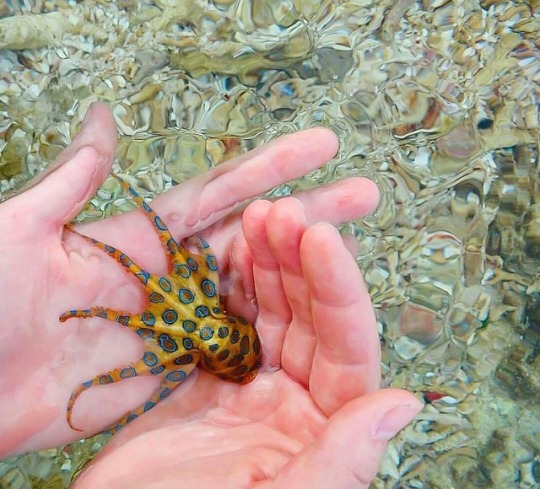Text
Daily Jellyfish #3 - Nemopilema nomurai
Nemopilema nomurai (Animalia; Cnidaria; Scyphozoa; Rhizostomeae; Rhizostomatidae) AKA 'Nomura's Jellyfish'.

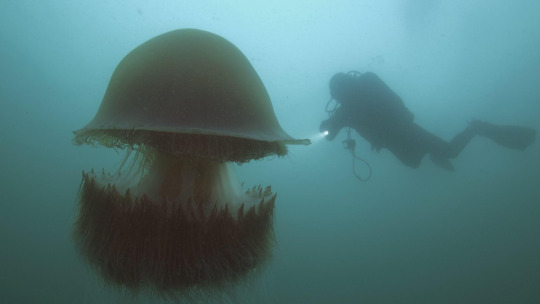
© PBS LearningMedia
N. nomurai are known to grow up to 2m in diameter, and weigh up to 200kg. They are the second largest known jellyfish in the world, just trailing behind Cyanea capillata (Lions Mane Jellyfish), and can grow from the size of a grain of rice to their full size within six months.
Supposedly, they live in a depth range of about ~0-176m in the Epipelagic (Sunlight) Zone. Primarily, they are found in the waters between China and Japan - most notably the Yellow and East China seas.
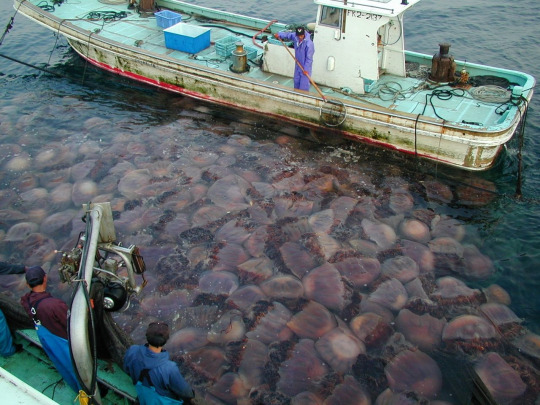
© Y. Taniguchi
For the last ~20 years, population blooms in N. nomurai have been increasing greatly - causing great economic damage to Japanese fisheries. To combat these overpopulation blooms, recent research has sought to find ways to convert into resources (i.e. food, medicine, and agricultural tools).
When under attack or threat, N. nomurai will release billions of sperm or eggs which then attach to rocks and corals. These then grow into even more jellyfish (sometimes millions) at later times, making removal of these jellyfish very difficult.
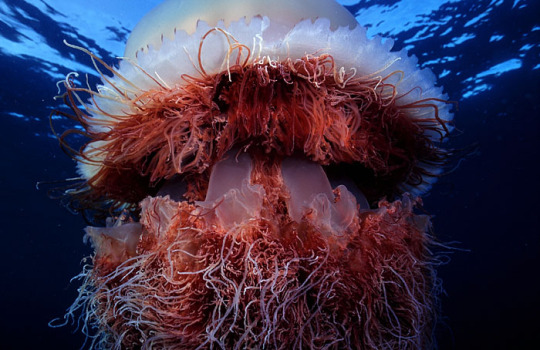
© Hushigi
Feeds mostly off of zooplankton and larger fish, to which they poison for easier consumption, and devour them with their hundreds of microscopic mouths.

Masterlist! // Honestly such a haunting jellyfish, the sheer size of them is absolutely terrifying. I love their stinging tentacles! The way they billow out is beautiful <3

#informative#info dump#marine science#marine biology#marine life#nemopilema nomurai#n. nomurai#nomura's jellyfish#jellyfish#jellies#daily jellyfish#personal project
8 notes
·
View notes
Text
Men of war, oh how they've fallen
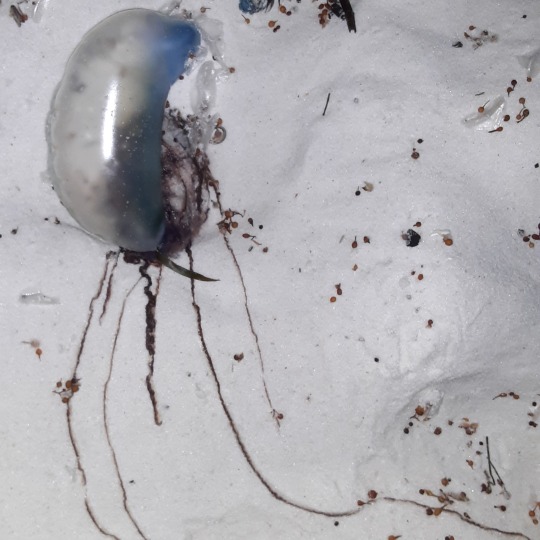
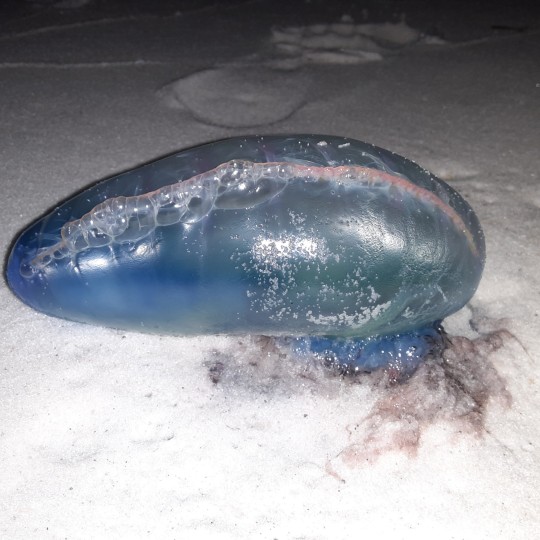
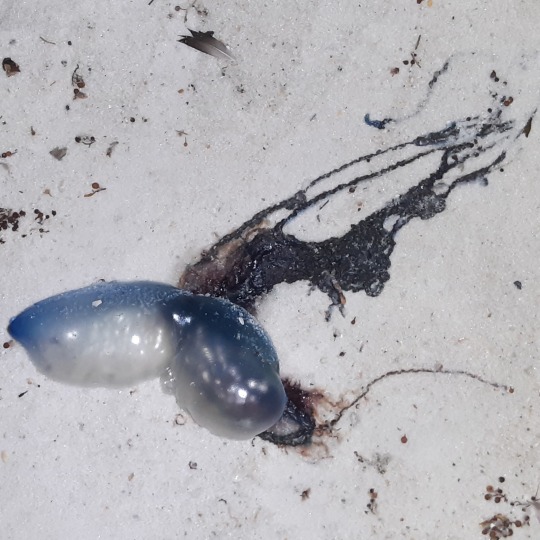
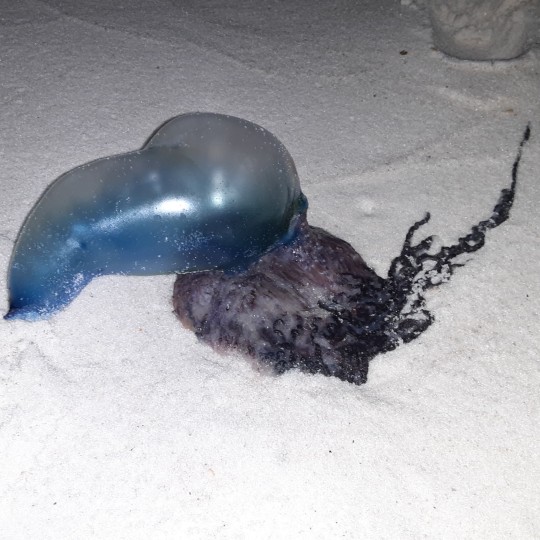
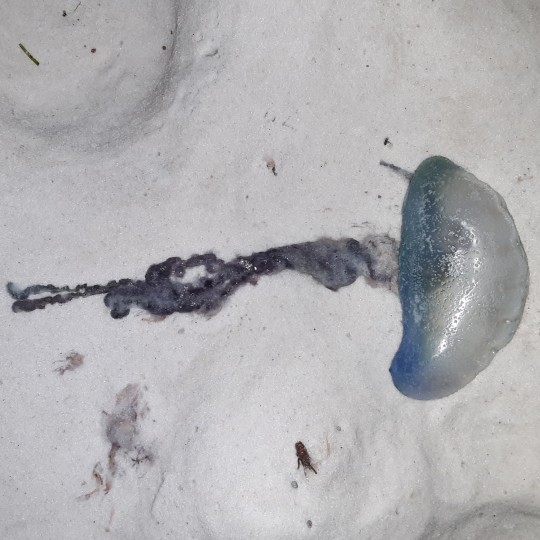
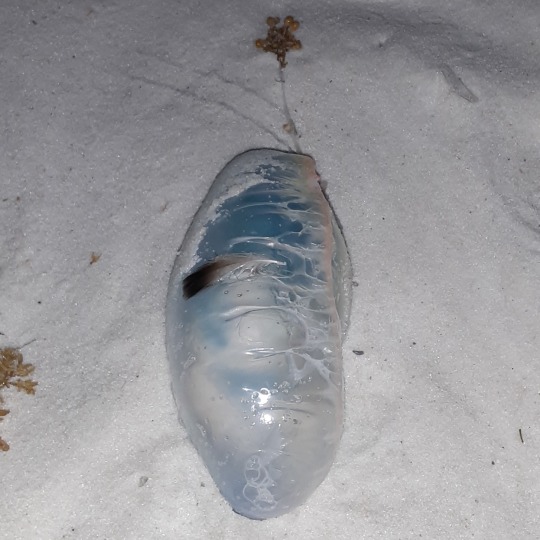
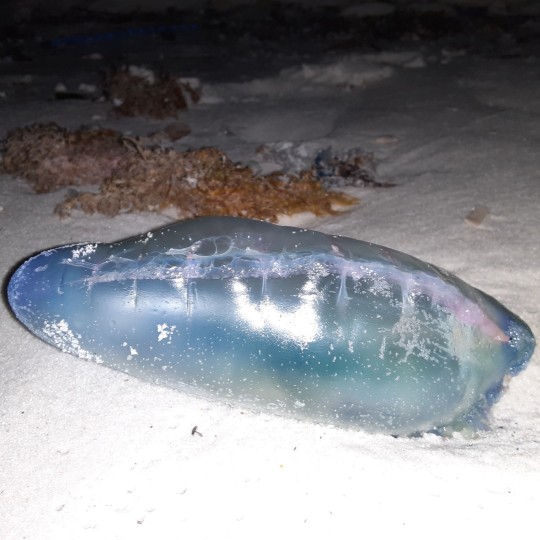
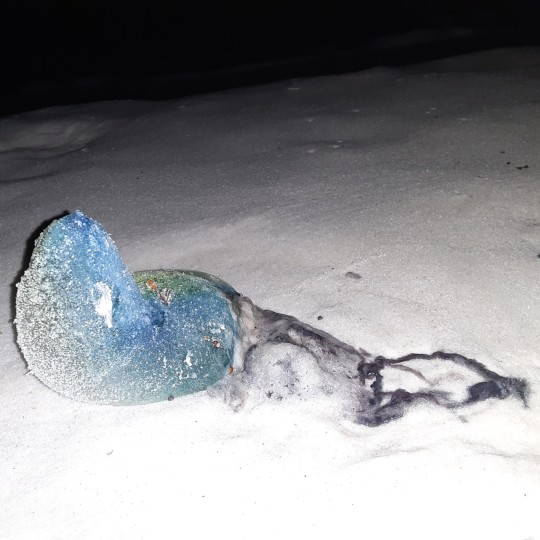
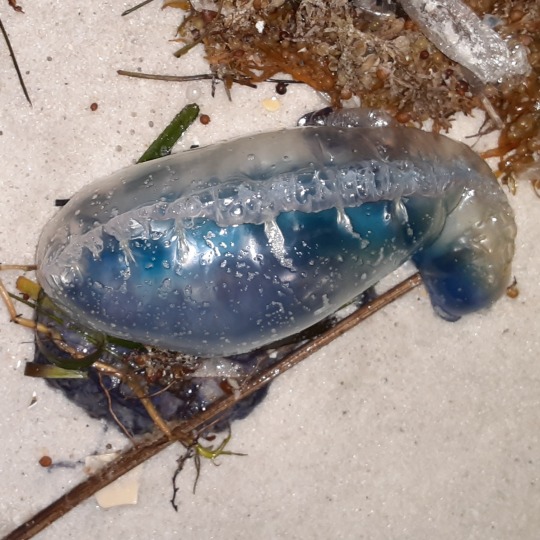
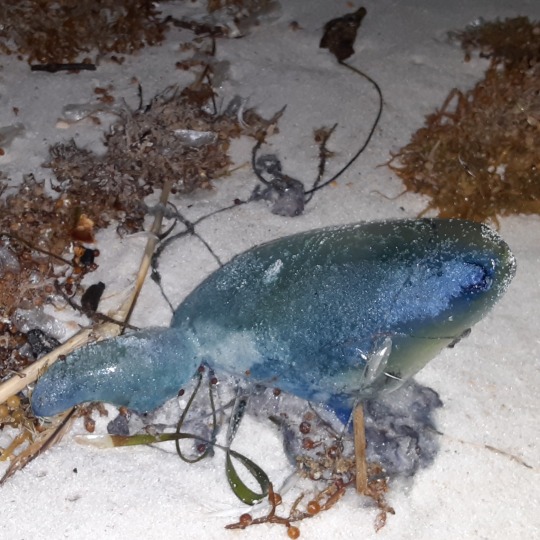
27 notes
·
View notes
Text
Get a wiggle on this Monday with our sand dollars!
9K notes
·
View notes
Text
Daily Jellyfish #2 - Bathykorus bouilloni

Bathykorus bouilloni (Animalia; Cnidaria; Hydrozoa; Narcomedusae; Aeginidae) AKA the 'Darth Vader Jellyfish'.
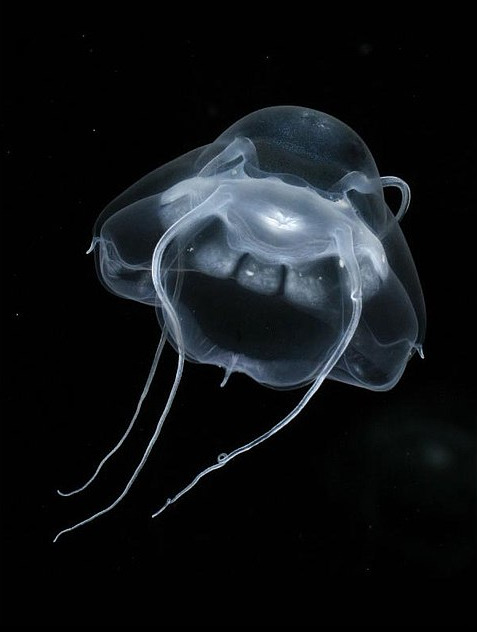
© 2005 Kevin Raskoff
Has four primary noncontractile stinging tentacles set on it's bell. When foraging for prey (i.e. krill and gelatinous animals), the four primary tentacles will usually be held above the bell in the direction of the movement - a foraging technique called 'stealth predation'.
They also have four shorter secondary tentacles, which are set lower down. Each of these lower four secondary tentacles have a statocyst on either side.
B. bouilloni usually ranges to around 2cm in width. It's coloration is transparent and pale blue.
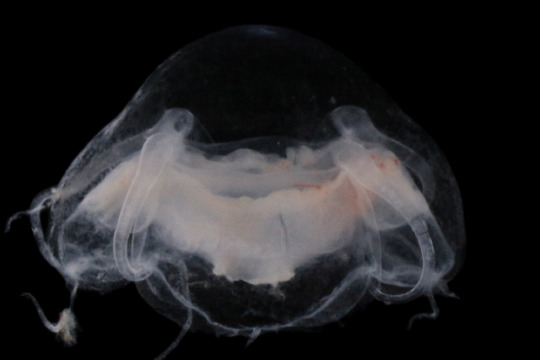
© 2015 Aino Hosia
B. bouilloni is currently the only species in the monotypic genus Bathykorus.
Typically it can be found at a depth range of about 800-2500m - a mid-ground between the Mesopelagic (Twilight) and Bathypelagic (Midnight) zones. Found in the Arctic Ocean, most notably around Greenland and the north of Canada.
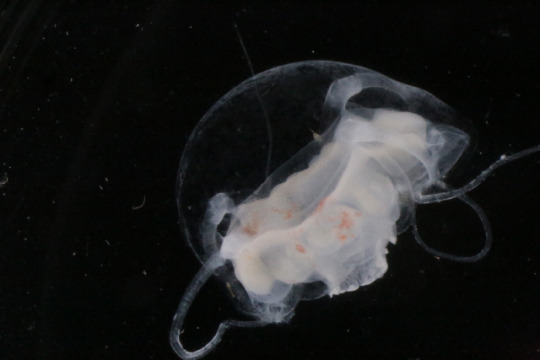
© 2015 Aino Hosia
Unlike other jellyfish, B. bouilloni do not have a polyp or medusae stage in their life cycle. Additionally, they are unique in that they commence some of their development inside the body of another adult jellyfish, rather than open water. To achieve maturation, they parasitically feed off of their host jellyfish.
They do not stay in the same jellyfish for the entire process, and will sometimes even feed off a species of jellyfish that isn't it's own.
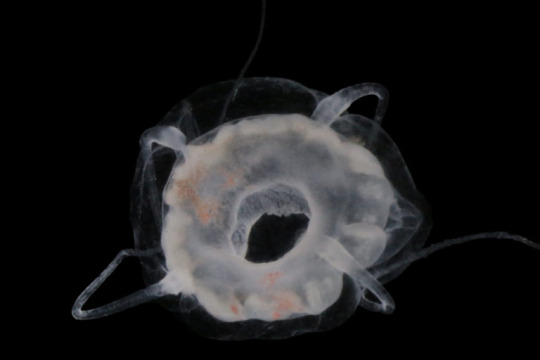
© 2015 Aino Hosia

Masterlist! // Truly a funky little dude. They run in my thoughts rent free. Their life cycle is so cool - definitely deserving of their own genus!
#informative#info dump#marine science#marine biology#marine life#bathykorus bouilloni#b. bouilloni#darth vader jellyfish#jellyfish#jellies#daily jellyfish#personal project
20 notes
·
View notes
Text
Daily Jellyfish Masterlist (A-Z):

A: B:
✰ Bathykorus bouilloni (Day #2)
C: D: E: F: G: H: I: J: K: L: M: N:
✰ Nemopilema Nomurai (Day #3)
O: P: Q: R: S:
✰ Stygiomedusa gigantea (Day #1)
T: U: V: W: X: Y: Z:

5 notes
·
View notes
Text
Daily Jellyfish #1 - Stygiomedusa gigantea <3

Stygiomedusa gigantea (Animalia; Cnidaria; Scyphozoa; Semaeostomeae; Ulmaridae) AKA the 'Giant Phantom Jellyfish'.

© 2007 MBARI
Lacks stinging tentacles, but does have four oral arms that are assumed to be able to grow up to 10m long. These arms trap and engulf their prey (i.e. plankton and small fish).
It's bell, which can grow up to 1m in length, is made of a flexible tissue that allows it to expand up to ~4-5 times it's size - presumably allowing it to envelop any prey brought up to it by it's oral arms, so that it might digest it via the canals located along the mouthparts.

© 2007 MBARI
Tends to be more dominant in areas with low productivity, like the open ocean, which are usually lesser desired by predator species because of the lack of nutrients required to support most living organisms.
Typically it lives in the Midnight Zone (AKA Bathypelagic: ~1000-4000m), but is presumed to reach greater depths, spanning from the surface to 6665m. It is also presumed to live worldwide, save the Arctic Ocean.
Fewer than 130 sightings have ever been recorded.
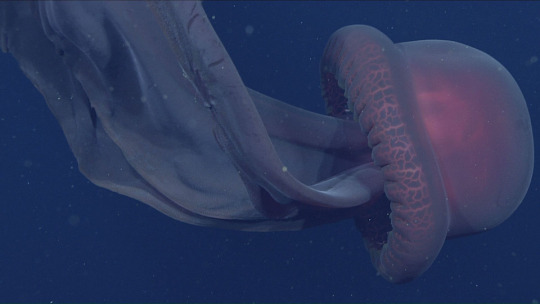
© 2018 MBARI
Collected S. gigantea samples suggest a reddish-orangish coloration, which, because visible light can only penetrate so far, allows them to appear almost invisible or faint depending on the depth of the water.
Appears to have a symbiotic relationship with the ophidiiform fish, Thalassobathia pelagica - the S. gigantea providing vital shelter with it's bell in the open ocean depths, and the T. pelagica reciprocating by removing and feeding on any parasites the jellyfish might harbour. The two are even suggested to be able to re-associate with one another when separated.

© 2003 MBARI

Masterlist! // My favourite jellyfish ever! It's my dream to be able to one day see one myself and contribute to it's sightings and research alongside a team <3

All images are from the official MBARI website.
#informative#infodump#marine science#marine biology#marine life#stygiomedua gigantea#s. gigantea#giant phantom jellyfish#phantom jellyfish#jellyfish#jellies#daily jellyfish#personal project
37 notes
·
View notes
Text
reblog ifyou love her and she makes you smile the coelacanth

52K notes
·
View notes
Text
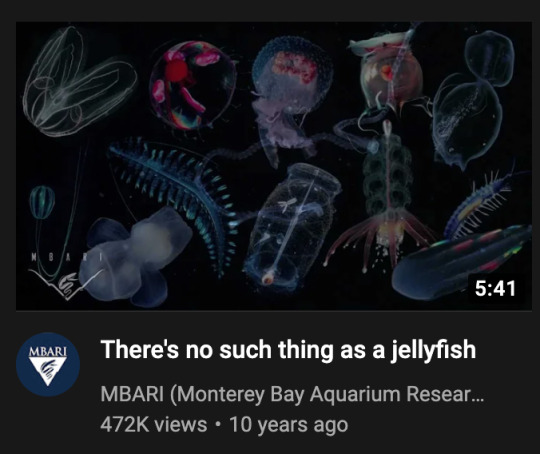
dont you dare lie to me monterey bay aqaurium research institute
#mbari#monterey bay aquarium research insititue#jellyfish#cnidarians#cnidaira#marine science#marine biology
259 notes
·
View notes
